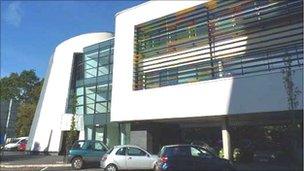£5m genetic research centre opens in Cardiff
- Published

Cardiff University's £5m Cancer Genetics Building
A £5m research centre which it is claimed will help Wales lead the genetic fight against cancer is being opened in Cardiff.
The Cancer Genetics Building, based at the University Hospital of Wales, provides extra space for the Institute of Medical Genetics.
The institute's work has already identified genes linked to bowel cancer and Huntingdon's Disease.
The new facility has two laboratory floors for diagnosis and treatment.
It is aimed at enabling further research into conditions like Tuberous Sclerosis Complex (TSC), a condition causing tumours in the brain, heart and kidneys which leads to epilepsy, autism and severe learning disabilities.
A team from the Institute of Medial Genetics was part of a group which first identified TSC genes, allowing trials for potential treatments.
Among those who hope to benefit from the centre is Trystan James, 24, from Llanelli in Carmarthenshire, who was diagnosed with TSC when he was eight months old.
His mother, Marie, said: "To learn that one's child has a serious genetic disorder, with all its implications, is a shock.
"To learn that the condition can be fatal, will probably result in learning disabilities, with the almost certain prospect of epilepsy, plus the prospect of severe facial skin problems, marring appearance for life is, to say the least, frightening.
'Mutation'
"The course of the condition cannot be predicted. There is as yet no cure. We can but cope from day to day to watch, care, hope and wait."
Trystan and his family have been invited to the opening ceremony on Thursday.
His mother added: "The advancement in research that the Cardiff team have developed is something we didn't dare hope would come in Trystan's lifetime."
Professor Julian Sampson, Head of the Institute of Medical Genetics, said: "The new cancer genetics building offers a real boost for our research and helps enhance our work unravelling the genetic changes and mechanisms that lead to cancer."
One of the centre's main aims will be linking two areas of research - genetic research that identifies DNA changes associated with cancer, and examining the effects of genetic changes on proteins within cancer cells.
Professor Ray Waters, of Cardiff University's School of Medicine, said: "Every day the body experiences millions of DNA damaging events within the cells that make up the body.
"We can repair much of this damage, but the precise details of how this happens is still unknown. If DNA damage is not repaired it can cause mutation and cancer."
The research centre is to be officially opened by First Minister Carwyn Jones.
- Published29 November 2010
- Published26 August 2010